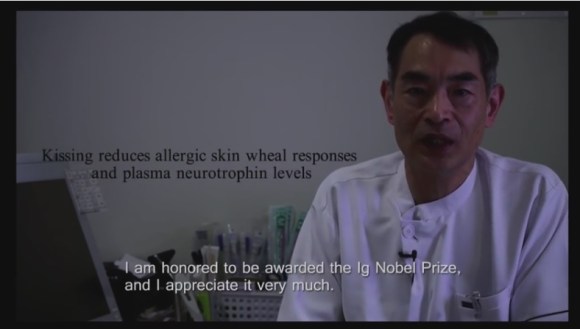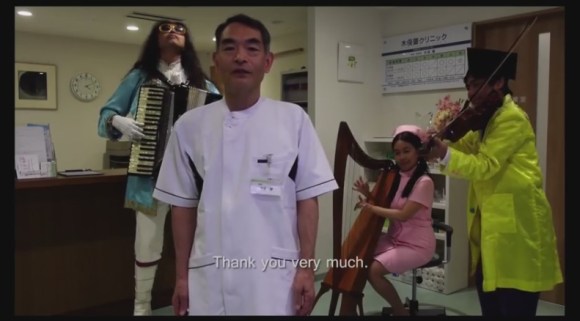
Japan has had a pretty good track record with the annual Ig Nobel Prize. Scientists from all over the country have been awarded for nine years straight for their contributions to wacky and humorous research. Last year, Professor Kiyoshi Mabuchi recieved the Ig Nobel Prize in Physics for determining exactly how slippery a banana peel on the floor is.
Now, Dr. Hajime Kimata of the Osaka Prefecture Neyagawa Allergy Clinic has been given the Ig Nobel Prize in Medicine. However, rather than investigating a silly topic, Dr. Kimata’s findings were actually rather sweet: Kissing can reduce a person’s allergic reactions.
In a 2003 study, Kimata examined a group of 60 subjects with either hay fever or allergic eczema as well as a control group of 30 people with no allergic problems. The subjects all claimed to not kiss on a regular basis.
Kimata then provided them with a private room in which they were instructed to make out for 30 minutes straight with their significant other. Because he’s an old softy, Kimata arranged soft music to be piped into the room as well.
▼ I don’t think this was where the music came from…but I’m not 100 percent sure of that.
Interestingly the allergy sufferers showed a decrease in skin reactions to dust mites and Japanese ceder pollen after their make-out session. There was also a decrease in certain neurotrophins and growth factors (proteins) found in their blood plasma. On the other hand, no change in these proteins was observed in the subjects who did not suffer from allergies after kissing.
In 2004 Kimata took things to the next level and tested the effects of sex on allergic skin rashes. The results were similar to kissing in that “sexual intercourse significantly reduced skin weal responses induced by Japanese cedar pollen or house dust mites.”
▼ The Ig Nobel Prize in Medicine was shared with a team from Slovakia who determined that you can extract the DNA of a man from a woman’s saliva up to an hour after they kissed.
Finally, in a 2006 study, Kimata observed that kissing also triggers a reduction in immunoglobin E (IgE) production which is associated with all kinds of allergies from hay fever to asthma.
Dr. Kimata was unable to attend the awards ceremony on September 17 due to a scheduling conflict, but he sent a video message from the clinic where he works as director.
There you have it folks. You now know how to beat atopic dermatitis in certain reactions, so get out there and start sucking face. Even if you don’t have anyone to kiss at the moment, some people have developed work-arounds.
Other Ig Nobel Prize winners for 2015
Chemistry Prize
Australia/USA
Callum Ormonde, Colin Raston, Tom Yuan, Stephan Kudlacek, Sameeran Kunche, Joshua N. Smith, William A. Brown, Kaitlin Pugliese, Tivoli Olsen, Mariam Iftikhar, and Gregory Weiss
For almost being able to chemically “unboil” an egg
Physics Prize
USA/Taiwan
Patricia Yang, David Hu, Jonathan Pham, and Jerome Choo
For determining that mammals of all shapes and sizes take about the same time to pee (21 seconds give or take 13 seconds)
Literature Prize
The Netherlands/USA/Belgium/Australia
Mark Dingemanse, Francisco Torreira, and Nick J. Enfield
For their groundbreaking work on international use of the word “Huh?”
Management Prize
Italy/Germany/Singapore/USA/UK/India/France/Luxembourg/Germany/Japan
Gennaro Bernile, Vineet Bhagwat, and P. Raghavendra Rau
For finding a correlation between risk-taking leaders of business and their childhood experiences of natural disasters with no negative consequences
Physiology and Entomology Prize
USA/Canada/UK/The Netherlands
Justin Schmidt, and Michael L. Smith
To Schmidt for developing the Schmidt Sting Pain Index which measures the pain felt by various insect stings and to Smith for letting himself be stung several times on 25 different parts of his body including inside his nostrils and on the shaft of his penis
Economics Prize
Thailand
The Bangkok Metropolitan Police
For giving their officers extra money if they refuse to take bribes
Mathematics Prize
Austria/Germany/UK
Elizabeth Oberzaucher, and Karl Grammer
For mathematically finding if it was possible for Moroccan Emperor Moulay Ismael the Bloodthirsty to father 888 children in a period of 30 years, and if so how
Biology Prize
Chile/USA
Bruno Grossi, Omar Larach, Mauricio Canals, Rodrigo A. Vásquez, and José Iriarte-Díaz
For making chicken walk like dinosaurs by attaching fake tails to them
Diagnostic Medicine Prize
Canada/UK/New Zealand/USA/Bahrain/Belgium/Dubai/India/South Africa/Syria/China
Diallah Karim, Anthony Harnden, Nigel D’Souza, Andrew Huang, Abdel Kader Allouni, Helen Ashdown, Richard J. Stevens, and Simon Kreckler
For discovering you can accurately diagnose the severity of appendicitis by putting the patient in a car, driving over speed bumps, and seeing how they react
Congratulations to all the winners!
Source: Improbable Research , Science Direct (1, 2), Taylor and Francis Online, Nishi Nippon Shimbun
Images: YouTube/ImprobableResearch



 Japanese team wins Ig Nobel prize for confirming that banana peels are in fact slippery
Japanese team wins Ig Nobel prize for confirming that banana peels are in fact slippery Japanese doctor wins Ig Nobel Prize for learning we can kind of breathe in through our butts
Japanese doctor wins Ig Nobel Prize for learning we can kind of breathe in through our butts Painting a cow like a zebra keeps away pests according to Ig-Nobel-winning Japanese research
Painting a cow like a zebra keeps away pests according to Ig-Nobel-winning Japanese research Potama serves up epic rice balls like no other, and there’s only one store in Tokyo
Potama serves up epic rice balls like no other, and there’s only one store in Tokyo Tokyo street sweets: The must-snack treats of Nakano’s Refutei
Tokyo street sweets: The must-snack treats of Nakano’s Refutei Japan’s craziest burger chain takes menchi katsu to new extreme levels
Japan’s craziest burger chain takes menchi katsu to new extreme levels New smartphone game turns car models into anime girls with model-worthy looks
New smartphone game turns car models into anime girls with model-worthy looks We spend Culture Day in prison, food was arguably better than Yoshinoya
We spend Culture Day in prison, food was arguably better than Yoshinoya McDonald’s Guarantees Your Order in 60 Seconds or You Get a Free Burger, Employs Actual Hourglass
McDonald’s Guarantees Your Order in 60 Seconds or You Get a Free Burger, Employs Actual Hourglass Japan Extreme Budget Travel! A trip from Tokyo to Izumo for just 30,000 yen [Part 2]
Japan Extreme Budget Travel! A trip from Tokyo to Izumo for just 30,000 yen [Part 2] How to make a lucky sushi roll with KFC fried chicken skin【SoraKitchen】
How to make a lucky sushi roll with KFC fried chicken skin【SoraKitchen】 Say hello to Japan’s new stationmaster cat!【Video】
Say hello to Japan’s new stationmaster cat!【Video】 Starbucks Japan releases first-ever Hinamatsuri Girls’ Day Frappuccino
Starbucks Japan releases first-ever Hinamatsuri Girls’ Day Frappuccino Japanese restaurant chain serves Dragon Ball donuts and Senzu Beans this spring
Japanese restaurant chain serves Dragon Ball donuts and Senzu Beans this spring Highest Starbucks in Japan set to open this spring in the Tokyo sky
Highest Starbucks in Japan set to open this spring in the Tokyo sky Tokyo Skytree turns pink for the cherry blossom season
Tokyo Skytree turns pink for the cherry blossom season Japan Extreme Budget Travel! A trip from Tokyo to Izumo for just 30,000 yen [Part 1]
Japan Extreme Budget Travel! A trip from Tokyo to Izumo for just 30,000 yen [Part 1] Yakuzen ramen restaurant in Tokyo is very different to a yakuza ramen restaurant
Yakuzen ramen restaurant in Tokyo is very different to a yakuza ramen restaurant Japan has only one airport named after a samurai, so let’s check out Kochi Ryoma【Photos】
Japan has only one airport named after a samurai, so let’s check out Kochi Ryoma【Photos】 Japanese drugstore sells onigiri at pre-stupid era prices, but how do they compare to 7-Eleven?
Japanese drugstore sells onigiri at pre-stupid era prices, but how do they compare to 7-Eleven? Adorable Totoro acorn key holders come with a special guest hidden inside[Photos]
Adorable Totoro acorn key holders come with a special guest hidden inside[Photos] Japan’s newest Shinkansen has no seats…or passengers [Video]
Japan’s newest Shinkansen has no seats…or passengers [Video] Starbucks Japan releases new sakura goods and drinkware for cherry blossom season 2026
Starbucks Japan releases new sakura goods and drinkware for cherry blossom season 2026 Foreigners accounting for over 80 percent of off-course skiers needing rescue in Japan’s Hokkaido
Foreigners accounting for over 80 percent of off-course skiers needing rescue in Japan’s Hokkaido Super-salty pizza sends six kids to the hospital in Japan, linguistics blamed
Super-salty pizza sends six kids to the hospital in Japan, linguistics blamed Starbucks Japan unveils new sakura Frappuccino for cherry blossom season 2026
Starbucks Japan unveils new sakura Frappuccino for cherry blossom season 2026 Foreign tourists in Japan will get free Shinkansen tickets to promote regional tourism
Foreign tourists in Japan will get free Shinkansen tickets to promote regional tourism The 10 most annoying things foreign tourists do on Japanese trains, according to locals
The 10 most annoying things foreign tourists do on Japanese trains, according to locals Take a trip to Japan’s Dododo Land, the most irritating place on Earth
Take a trip to Japan’s Dododo Land, the most irritating place on Earth Naruto and Converse team up for new line of shinobi sneakers[Photos]
Naruto and Converse team up for new line of shinobi sneakers[Photos] Is China’s don’t-go-to-Japan warning affecting the lines at a popular Tokyo gyukatsu restaurant?
Is China’s don’t-go-to-Japan warning affecting the lines at a popular Tokyo gyukatsu restaurant? Survey asks foreign tourists what bothered them in Japan, more than half gave same answer
Survey asks foreign tourists what bothered them in Japan, more than half gave same answer Japan’s human washing machines will go on sale to general public, demos to be held in Tokyo
Japan’s human washing machines will go on sale to general public, demos to be held in Tokyo Starbucks Japan releases new drinkware and goods for Valentine’s Day
Starbucks Japan releases new drinkware and goods for Valentine’s Day We deeply regret going into this tunnel on our walk in the mountains of Japan
We deeply regret going into this tunnel on our walk in the mountains of Japan Studio Ghibli releases Kodama forest spirits from Princess Mononoke to light up your home
Studio Ghibli releases Kodama forest spirits from Princess Mononoke to light up your home Major Japanese hotel chain says reservations via overseas booking sites may not be valid
Major Japanese hotel chain says reservations via overseas booking sites may not be valid Put sesame oil in your coffee? Japanese maker says it’s the best way to start your day【Taste test】
Put sesame oil in your coffee? Japanese maker says it’s the best way to start your day【Taste test】 No more using real katana for tourism activities, Japan’s National Police Agency says
No more using real katana for tourism activities, Japan’s National Police Agency says